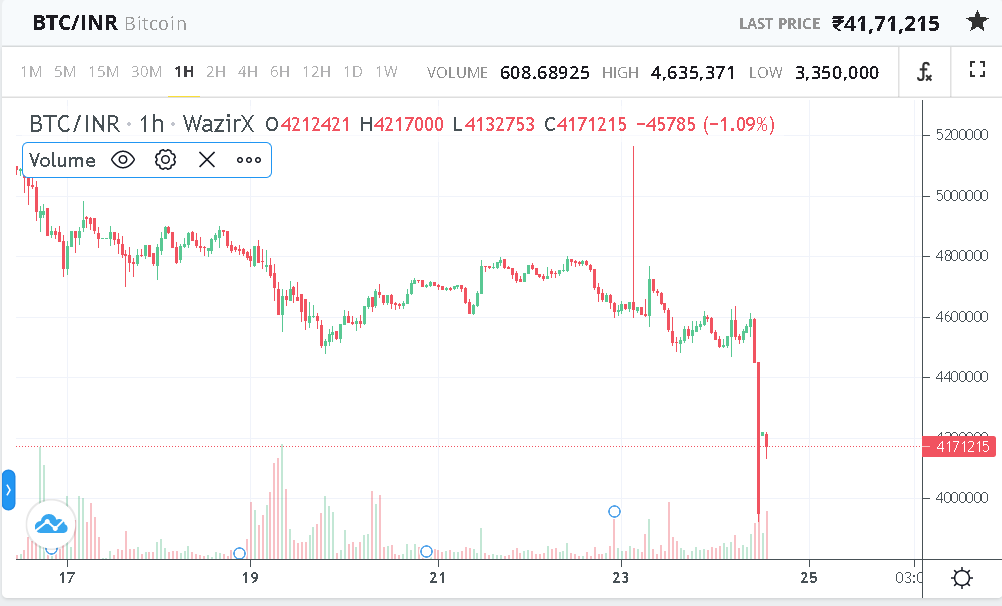Crypto ban in India: Following the rumors of unveiling of a bill that would ban all private crypto in India, the majority of cryptocurrencies prices on the Indian crypto exchange WazirX collapsed.
Indian investors started selling their cryptos on their largest crypto exchange, WazirX, following the panic sparked by regulatory discussions in India regarding a crypto ban. The exchange saw a significant price decrease for main cryptocurrencies, including Bitcoin (BTC) and Ethereum (ETH).
Soon after the announcement by the parliament that it would present 26 new bills including the Cryptocurrency and Regulation of Official Digital Currency Bill, 2021 crypto prices in India plummeted. The measure calls for a vote in the legislature on developing an official digital currency, as well as a prohibition on “all private cryptocurrencies.”
On Wednesday morning at 3:30 a.m. UTC, a massive sell-off on WazirX slashed the price of Bitcoin from around 4,600,000 Indian rupees ($61,820.73) to 3,917,659 rupees ($52,650.55), a decline of 14.8 percent in just two hours. Other popular coins like Ethereum and Cardano have also seen significant price drops on the exchange.

The bill to regulate cryptocurrencies came after a legislative panel meeting on crypto on Nov. 15, in which a majority of regulators agreed that, while cryptocurrency cannot be banned, it should be regulated more strictly.
The Reserve Bank of India announced in August that it planned to begin exploratory testing for a central bank digital currency by the end of 2021. With over 20 million crypto investors, India is now one of the world’s largest crypto markets.
Crypto ban in India: Rumored bill that would ban all private cryptocurrencies in India
The rumor to ban all the cryptocurrencies came after the bulletin posted on the Indian parliament’s official website (CBDC).

According to the post, the Cryptocurrency and Regulation of Official Digital Currency Bill, 2021 is supposed to create a background which will assist the central bank to create its own digital currency.
The draft bill also intends to make all private cryptocurrencies illegitimate in India. However, it allows for some exceptions in order to promote cryptocurrency’s underlying technology and applications, according to the bulletin.
This post by the Indian Government has created a spark of uncertainty among Indian crypto investors and situation seems to be chaotic at the moment in India. Indian investors are unsure whether to hold their crypto or not.
The confusion seems to be around the term “Private Cryptocurrency”. Many of the investors seems to be unaware about what exactly is private cryptocurrency? And does Bitcoin, Ethereum and other popular cryptos falls under private cryptocurrency or not?
What is Private Cryptocurrency?
All the crypto investors in India can breathe a sigh of relief for now, as the bill suggest banning all the private cryptocurrencies in the country.
In a very simple words, Private Cryptocurrency in crypto world are those coins which are completely hidden and can not be traced. In other words, they are also called as privacy coins.
Privacy coins are the kind of cryptos that permits private and anonymous blockchain transactions by covering the origin & destination of the transaction. These anonymous cryptocurrencies employ strategies like as masking a user’s genuine wallet balance and address, as well as combining several transactions to avoid chain analysis.
In opposite to this, anyone may see public addresses and transactions in Bitcoin, Ethereum, Cardano, and other non-privacy blockchains, making it reasonably easy to monitor someone’s payments and withdrawals.
Some famous private cryptocurrency includes Monero (XMR), Dash coin, Zcash (ZEC), Verge (XVG), Beam and so on. So, any individual investing in cryptos like Bitcoin, Ethereum, ADA, etc. can take a sigh of relief as these cryptos are not considered as private cryptocurrency in the crypto world.
However, we have not yet seen how the Indian government will define the Private Cryptocurrency in their bill. Some rumors even suggest that government might include all the privately operated cryptos as Private Cryptocurrency and will operate their own crypto issued by RBI (Reserve Bank of India).
But this rumor doesn’t make any sense as RBI issued crypto will be centralized more like USDT. The whole value in crypto industry is in its decentralized nature. So most likely in my opinion, the Indian government will not ban all the privately operated cryptos like Bitcoin, Ethereum, ADA, etc.
Is a ban on cryptocurrency even possible?
Because a cryptocurrency has no inherent value or liquidity, banning the tokens which may be classified as an asset, a commodity, a currency, or even a security could be problematic. Millions of individuals throughout the world might conceivably hold such a currency which are essentially non-bannable pieces of code and still agree to use it as a means of exchange, lending it value.
Because sending a cryptocurrency from one wallet to another is effectively the same as transferring data from one computer to another, a governmental restriction may not prevent people from sending cryptocurrencies to one another.
However, governments, on the other hand, can always find methods to erect hurdles to such digital token transactions and admission. Because crypto exchanges are where the majority of investors trade, blocking them is likely to drive away a portion of mainstream cryptocurrency users who haven’t yet dabbled in the technical world of crypto wallets and the like.
So, what exactly Indian government is visioning for cryptocurrencies in India?
While the law looks to be nearly identical to the original bill submitted in January, the latest document is not yet publicly available, so it is uncertain whether the two are identical. However, in recent months, speculation has grown that the government has changed its stance on cryptocurrencies and may seek to regulate them as assets rather than a form of payment.
Also read about: Cryptocurrency regulation in India is expected to be implemented in February
Despite the fact that the draft bill’s title and description appear to be identical to the one aimed at outlawing all private cryptocurrencies, there is a “high possibility” that the contents have altered. In a recent speech, India’s Finance Minister Nirmala Sitharaman stated that the government will not pursue a blanket ban on cryptocurrency, implying that the law may have undergone some amendments.
Crypto trading is expected to continue under the proposed bill, according to a video report by local news outlet India Today, as long as customers buy from crypto exchanges that meet specific conditions. According to the source, the measure may focus on limiting who is permitted to produce or issue new cryptocurrencies in order to protect investors.
The Reserve Bank of India (RBI), the country’s central bank, is noted for its skepticism about cryptocurrency. The RBI’s two-year crypto trading ban was overturned by India’s supreme court in March 2020, and the central bank had planned to appeal the decision. RBI Governor Shaktikanta Das stated last week that the central bank had “severe concerns from the standpoint of macroeconomic and financial stability,” but that blockchain technology can exist without cryptocurrencies.
Meanwhile, the Indian government appeared to relax its stance on cryptocurrency earlier this month, indicating that it will take a more proactive and forward-thinking approach to digital assets.
The prime minister of India, Narendra Modi, said that it is very important that all nations should work together on the crypto technology together and make sure that it does not end up in the wrong hands which might harm the younger generations.
Conclusion
A report by CrossTower suggest that around 15 million Indian crypto investors have invested more than $6.6 billion in digital assets.
Stakeholders will have a better understanding of what the government intends by ‘private’ cryptocurrencies after India’s crypto law is debated in Parliament. The rest of the jigsaw puzzle will fall into place only when a definition has been established.
- Also read about: Bitcoin City in El Salvador
- Also read about: Commonwealth Bank of Australia is providing crypto services
- Also read about: A major Russian bank is considering investing in cryptocurrency
- Also read about: Mastercard claims that any bank or retailer on its enormous network would soon be able to provide cryptocurrency services
- Also read about: The Dubai Financial Services Authority has approved the listing of a Bitcoin fund








If people are afraid losing crypto because of such ban predictions, they have to learn the market better and switch t privacy coins, for example. As some of them have their own private exchanges also. For example Crypton from Utopia p2p gained +650% during the last month and has no KYC decentralized exchange https://crp.is/. There are no restrictions or prohibitions on use by citizens of the United States or other countries. It can be a good way out if other crypto will be banned.